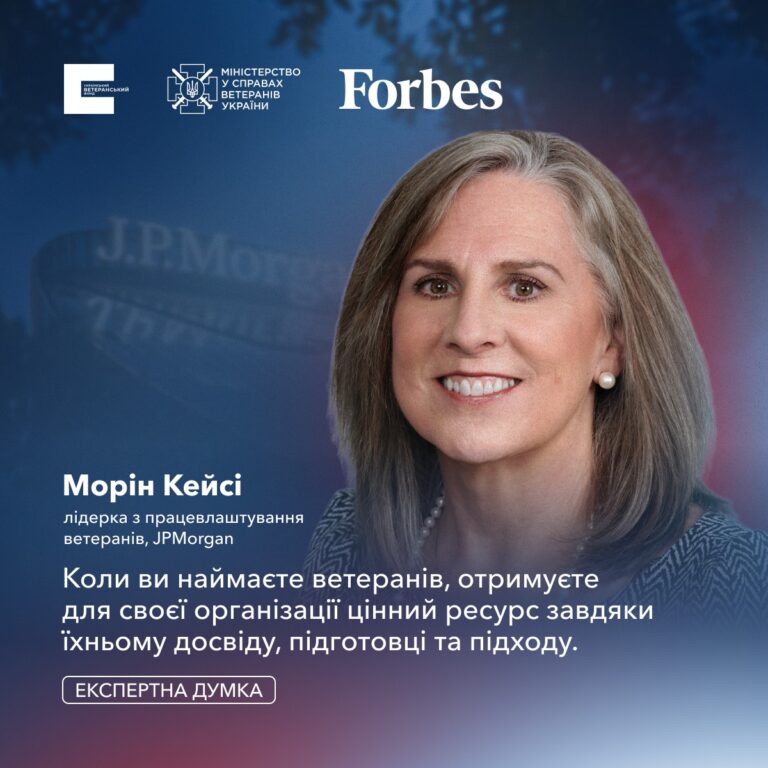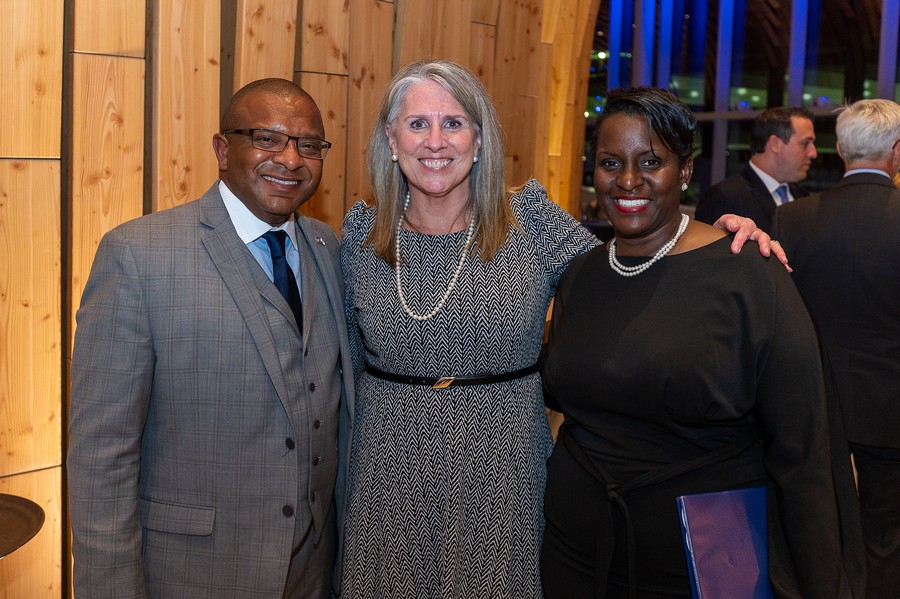Interview with Maureen Casey, American leader in veterans' employment

Hiring a veteran should be driven by the employer's best interests rather than simply fulfilling a charitable act or meeting a quota.
Veterans possess unique skills, knowledge, and career aspirations. Their military service equips them with valuable experiences that can be seen as a valuable asset. These individuals can bring significant benefits to companies.
To explore how to establish mutually beneficial cooperation between employers and veterans, we present an article featuring insights from Maureen Casey, a renowned leader in veteran employment.
This article is published in collaboration with the Ukrainian Veterans Fund of the Ministry of Veterans Affairs and Forbes Ukraine.
Illustration: Ukrainian Veterans Fund
JPMorgan, a company that has been hiring veterans in the US for 12 years, shares valuable insights on problem-solving, adaptability, and teamwork. What lessons can Ukrainian businesses learn from them? Interview

Maureen Casey believes that onboarding veterans requires more than just hiring and engaging them; they need to be equipped with the necessary tools for success. (Photo from personal archive)
Casey emphasizes that onboarding veterans goes beyond hiring them; they need to be equipped with the tools to succeed. As Ukraine prepares for the return of over a million veterans, companies must consider how to create a mutually beneficial relationship. The Ukrainian Veterans Fund team sought Casey's expertise on this matter.
JP Morgan, ranked 95th in Forbes USA's list of the most veteran-friendly companies in 2022, has implemented effective strategies. With a workforce of 270,000 employees, the company offers mentoring support programs for veterans. They provide opportunities for veterans to explore different departments, enabling them to build an ideal career path. Since 2011, the recruiting team has successfully hired over 10,000 veterans, assisting them in retraining, acquiring new qualifications, and facilitating their transition back into civilian life.
The Veteran Jobs Mission campaign is another significant initiative. JP Morgan and other organizations have committed to employing 100,000 veterans over a 10-year period. This mission has brought together 200 companies and surpassed its commitment by employing over 240,000 veterans in less than three years.
Maureen Casey has played a pivotal role in developing these programs, leading the military department of the company and currently serving as the Director of Operations for the Veterans and Military Families Institute at Syracuse University since 2015.
Through our collaboration with the Ukrainian Veterans Fund, Forbes had the opportunity to speak with Casey and gain insights into her work with veterans in the private sector. We explore what lessons can be learned from American companies and how they can be applied to benefit Ukraine.
Training on both sides of the equation
JP Morgan has been actively working on veteran onboarding for over 10 years. What have we learned during this time?
In 2011, JPMorgan established the Military and Veterans Affairs Initiative in response to the high unemployment rate among veterans in the United States, which was almost twice as high as it is today.
JPMorgan's Chairman and CEO, Jamie Dimon, recognized the potential of veterans and engaged with company executives to address the issue. It became clear that tangible employment opportunities could be created for veterans, given their valuable skills in adaptability, problem-solving, leadership, and teamwork.
This realization led to the formation of the Veterans Job Mission, a collaboration among national corporations committed to implementing veteran-friendly practices throughout their organizations. It became evident that the focus extended beyond attracting and hiring veterans; it also encompassed their training, development, and retention.
While I'm unsure about the Ukrainian army's experiences, it's worth noting that in the US army, individuals change jobs every two or three years. Therefore, our efforts aimed not only to transition veterans to the private sector but also to prepare companies for their integration. This involved discussions about military culture, the unique contributions veterans bring, and understanding their expectations.
We recruited a group of veterans for a summer internship where they worked alongside civilian employees. During the program, one of the veterans raised a question about the constant presence of other employees in the chief's office, expressing his concern based on his experience in the army where being under constant supervision was usually seen as negative. We had to explain to him and the others that building a relationship with a supervisor was an essential part of future employment opportunities. Therefore, we had to provide training and guidance to both veterans and supervisors.
Another important aspect of our work is helping veterans articulate their individual contributions to teamwork. In the military, they prioritize teamwork and often sacrifice their own individuality for the sake of the team's success, as their lives depended on it. However, in the private sector, it is crucial for them to be able to express their unique contributions to the overall effort. This is an important concept that we strive to convey to them.
One significant realization for me is that onboarding veterans goes beyond simply engaging and hiring them; it is essential to equip them with the necessary tools for success. Once we provide them with the support they need, they can surpass their colleagues in terms of values and skills.
Now, why should companies consider hiring veterans? What sets them apart in terms of skills and qualities?
Veterans possess highly valuable skills such as leadership, teamwork, and adaptability, which are highly sought after in the corporate world. These are skills that military personnel have honed throughout their service. Additionally, veterans demonstrate remarkable flexibility and effective communication abilities, as the US military operates in diverse environments across 100 different countries.
Our role is to assist veterans in translating and transferring these skills to fit into the corporate culture. On the other hand, we also work on helping managers understand and appreciate the nature of military service. Initially, this posed challenges since less than 1% of the US population served after 9/11, leading to a lack of common understanding among hiring managers regarding military experiences. Many hiring managers struggle to comprehend how someone with a combat infantry background, for example, could fit into their company. Therefore, it is crucial to facilitate mutual understanding between veterans and hiring managers, highlighting technical and transferable skills that are valuable in both contexts.

Maureen Casey is currently the head of the Institute of Veterans and Families of Servicemen, having previously led the military department at JP Morgan.
JPMorgan Chase has implemented a mentoring program called the Pathfinder Mentoring Program. Why is mentoring crucial for supporting the adaptation of veterans?
Although the program was established after my departure from JPMorgan, I can provide a general perspective on its significance. A mentor who is knowledgeable about the company's operations and provides a platform for asking questions can greatly contribute to a veteran's success. There may be situations where veterans hesitate or feel ashamed to approach their managers or colleagues with certain inquiries. Having a trusted mentor from a different area of expertise creates a valuable opportunity for brainstorming, open discussions, and seeking guidance to ensure a successful transition and integration.
Opportunities for Support
Following the victory, approximately one and a half million Ukrainian soldiers will return to civilian life. What actions should every Ukrainian company take to facilitate the comfortable reintegration and employment of veterans, regardless of their background or field of expertise?
Firstly, it is crucial to recognize that veterans require time for their transition. The shift from military service should not be underestimated. After a life characterized by tremendous stress, high pressure, and constant risk, how can they effectively transition into civilian life?
Secondly, employers can assess their hiring needs and identify the necessary skill sets. How can we assist transitioning veterans in understanding and accessing the available opportunities? In my 12 years of experience, the greatest challenge remains ensuring that veterans are aware of the full range of possibilities awaiting them after their military service.
When developing a program for the reintegration of veterans, what is the most non-obvious aspect to prioritize?
It is crucial to emphasize the importance of the ability and desire to learn. Dedicate sufficient time to understanding the skills and aspirations of military personnel as they transition to civilian life. Just because someone served as a tank driver in the military does not automatically mean they wish to continue driving a truck upon their return. It is essential to grasp the specific skills they need to acquire, identify their employment goals, and provide them with the necessary tools for upskilling or reskilling, enabling a seamless transition into the workforce.
At the Institute for Veterans and Military Families (IVMF), we offer training programs in partnership with companies like JPMorgan, focusing on successful employment. Our approach aims to provide a comprehensive end-to-end solution, which need not be overly complex. The key lies in understanding the veteran's career aspirations. What programs can we offer to assist them in achieving their goals? Concurrently, we can engage with employers and highlight the talented pool of veterans interested in cybersecurity or infrastructure recovery opportunities.
Our objective is to establish a well-defined path that guides veterans from the transition period to new employment opportunities, ensuring a smooth and successful integration into civilian life.
In some Ukrainian companies, "first touch" specialists are appointed to facilitate the transition of returning veterans. These individuals play a vital role in making the veteran's integration easier. What aspects should be given attention when a veteran returns and during their first year on the job?
The key aspect is mutual understanding. In the United States, we refer to this as the civilian-serviceman gap. While the situation may be somewhat different in Ukraine, considering the broader impact of the war on families beyond just those who served in the military, we must not overlook the experiences people have endured.
How can we ensure that there is a shared understanding of the service and sacrifices made by service members, fostering an environment where both sides can thrive in the future? For a veteran who enlisted right after high school at the age of 18, their situation will be unique. After an average of three to four years of service, they transition to study. Their life experiences differ from those of other 18-year-olds who pursued college or entered the workforce. This disparity creates a gap. How can we effectively discuss their military experience with them?
It is crucial to create opportunities for mutual understanding of what military service entails and provide space for individuals to share their life experiences. Establishing support groups for veterans to connect with fellow colleagues is important. These groups facilitate communication between individuals with diverse backgrounds, service histories, and experiences. Such kinship groups serve as the foundation for success, fostering an environment where people better understand each other. In the long run, this will help us achieve our desired goals for the veteran community.
The concept we want to emphasize is the intentional hiring of veterans. This is not an act of charity, but rather aligns with the company's best interests. How would you comment on this?
During my time at JPMorgan, there was a push from many companies to establish hiring quotas for veterans. Some suggested that a specific percentage, like 10% of the workforce, should consist of veterans, or a fixed number of ex-servicemen must be hired. However, I was hesitant about hiring based on quotas as I believed it wouldn't benefit either side. Instead, I proposed a different approach: starting with hiring one veteran at a time. If a veteran could demonstrate their value within the organization, they would serve as an example.
While the head of our department had reservations, they agreed to hire five veterans for our growing team. Eventually, the goal was to have 100 individuals working in the department.
As a result, we welcomed five veterans to the team. After three months, representatives from the department approached us and said, "We want to hire all the ex-servicemen you recommend because they have significantly improved our business processes. They have successfully built a company that aligns with their needs, and they complete tasks faster than their non-veteran counterparts." That's how it unfolded.
Strategically speaking, I would suggest starting with one veteran. By integrating them into the organization, they can showcase their abilities and make a positive impact. As their colleagues witness the value that veterans bring, a movement begins to take shape, paving the way for hiring more ex-servicemen.
Understanding the game rules
Veterans often undergo career and job changes to redefine themselves. JPMorgan has implemented a two-year rotation program that enables veterans to explore different roles within the company. How does this program work?
I must clarify that this program was initiated after my departure from the company. However, I can speak generally about the concept of creating such opportunities within organizations. We provided an example of how it works by showcasing different departments. At JPMorgan, individuals have the chance to gain experience ranging from the trading floor of the New York Stock Exchange to a position as a bank teller. With 250,000 employees, the organization offers a wide range of career opportunities. The goal is to allow individuals, including veterans, to explore different areas of business and the careers associated with them. This approach helps veterans discover parts of the organization that they may not have considered previously.
For recruiters and managers, it can sometimes be challenging to understand how veterans fit into the organization. Internship programs serve as valuable opportunities in this regard. An internship functions similarly to a probationary period for employment, providing insights into how a person performs as a team member and assessing their potential.
Recently, the US Chamber of Commerce introduced a scholarship and internship program specifically for military spouses. The aim remains the same: providing both parties with the opportunity to evaluate their compatibility and determine if they are a good fit for each other.
When you hire veterans, you gain a valuable resource for your organization through their experience, training, and approach. - Maureen Casey
Does the US government provide financial assistance to private businesses for integrating veterans? Do they support their education?
There are tax incentives available for companies that hire veterans. The federal government also offers financial support, although it's not mandatory, for training transitioning service members and facilitates easier access to military personnel for companies.
Even if a service member transitioning to civilian life is uncertain about their career path, they need to explore employment opportunities. Our government invests in non-profit organizations that provide advanced training and additional education, and it also offers direct training programs. Other federal agencies collaborate in this effort, including the US Department of Labor, the Small Business Administration, and the Department of Veterans Affairs, among others.
How do you support disabled veterans in the workplace? Have special inclusive spaces been created for them?
Certainly. This applies to individuals with disabilities, including veterans. The United States has comprehensive accommodation laws that protect the rights of people with disabilities, both visible and invisible. These laws, rules, and policies are not specific to veterans but are applicable to everyone. Compliance with these regulations is not only a legal requirement but also a moral obligation. In the private sector, such as at Syracuse University, creating accessible spaces is part of standard employment practices. The building I am currently in is one of the most handicap accessible buildings in the region. Ensuring accessibility for individuals with disabilities is a priority in our campus and workplace environments.
Approximately 30% of Ukrainian army servicemen are women, many of whom have or may have children in the future. Is the employer prepared to provide equal conditions for female colleagues?
Childcare remains a significant barrier to employment for veterans with children and military spouses. Some companies offer on-site childcare facilities, while the government provides childcare credits. However, it is uncertain whether we have fully addressed this issue. It is a valid concern that requires further attention.
The COVID-19 pandemic has brought about various opportunities for remote work and flexible schedules, which have provided parents with greater adaptability. However, it is important to note that this issue is still far from being fully resolved.
If a veteran lacks sufficient experience but applies for a job, how can they avoid potential discrimination?
The key is to focus on creating a match between the veteran and the employment opportunity, ensuring that individuals are not hired solely based on their veteran status. Veterans themselves do not seek preferential treatment, as they understand it wouldn't benefit the company.
To address this, intervention points are necessary, where we can provide skills or knowledge to help veterans qualify for the jobs they desire. By establishing training programs specifically designed for veterans, we can create a blueprint that can be applied to other populations, such as individuals returning to work after parental leave or those seeking retraining after incarceration.
The solution lies in upgrading or retraining service members during their transition period, equipping them with the necessary tools to succeed in their desired positions.
Is there a specific message you would like to convey to our readers that we haven't discussed yet?
Certainly, one crucial aspect to highlight is the efforts made in the United States to support the military. The focus is on providing additional educational resources that assist military personnel transitioning to civilian life or veterans in securing employment. Given the sacrifices they have made to protect and preserve the nation, investing in their successful integration is highly worthwhile.
The bottom line is this: When you hire veterans, you bring a valuable asset into your organization due to their unique combination of experience, training, and approach. The key lies in equipping them with the necessary tools. By providing them with proper guidance and training, they can master the rules of the game and consistently outperform expectations.